Related Research Articles
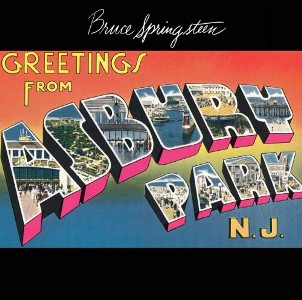
Greetings from Asbury Park, N.J. is the debut studio album by American singer-songwriter Bruce Springsteen. It was produced by Mike Appel and Jim Cretecos from June through October 1972 at the budget-priced 914 Sound Studios. The album was released January 5, 1973, by Columbia Records to average sales but positive critical reviews.

The Wild, the Innocent & the E Street Shuffle is the second studio album by American rock singer-songwriter Bruce Springsteen. It was recorded by Springsteen with the E Street Band at 914 Sound Studios, Blauvelt, New York, and released on November 5, 1973, by Columbia Records. It includes the song "Rosalita ", the band's most-used set-closing song through 1985.

Peter Seeger was an American folk singer and social activist. A fixture on nationwide radio in the 1940s, Seeger also had a string of hit records during the early 1950s as a member of the Weavers, notably their recording of Lead Belly's "Goodnight, Irene," which topped the charts for 13 weeks in 1950. Members of the Weavers were blacklisted during the McCarthy Era. In the 1960s, Seeger re-emerged on the public scene as a prominent singer of protest music in support of international disarmament, civil rights, counterculture, workers' rights, and environmental causes.
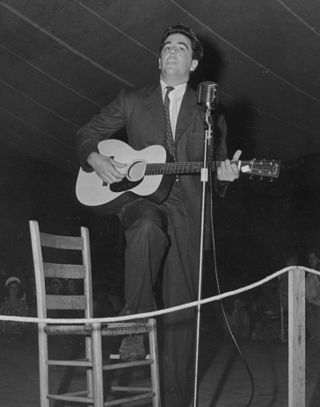
Alan Lomax was an American ethnomusicologist, best known for his numerous field recordings of folk music of the 20th century. He was a musician, folklorist, archivist, writer, scholar, political activist, oral historian, and film-maker. Lomax produced recordings, concerts, and radio shows in the US and in England, which played an important role in preserving folk music traditions in both countries, and helped start both the American and British folk revivals of the 1940s, 1950s, and early 1960s. He collected material first with his father, folklorist and collector John Lomax, and later alone and with others, Lomax recorded thousands of songs and interviews for the Archive of American Folk Song, of which he was the director, at the Library of Congress on aluminum and acetate discs.

Nebraska is the sixth studio album by American singer-songwriter Bruce Springsteen, released on September 30, 1982, by Columbia Records. Springsteen recorded the songs as demos on a 4-track recorder, intending to rerecord them with the E Street Band, but decided to release them as they were. Nebraska remains one of the most highly regarded albums in his catalogue.

Born to Run is the third studio album by American singer-songwriter Bruce Springsteen, released on August 25, 1975, by Columbia Records. As his effort to break into the mainstream, the album was a commercial success, peaking at number three on the Billboard 200 and eventually selling seven million copies in the United States. Two singles were released from the album: "Born to Run" and "Tenth Avenue Freeze-Out"; the former helped Springsteen achieve mainstream popularity. The tracks "Thunder Road", "Backstreets", "She's the One", and "Jungleland" became staples of album-oriented rock radio and Springsteen concert high points.

Sacred Harp singing is a tradition of sacred choral music that originated in New England and was later perpetuated and carried on in the American South. The name is derived from The Sacred Harp, a ubiquitous and historically important tunebook printed in shape notes. The work was first published in 1844 and has reappeared in multiple editions ever since. Sacred Harp music represents one branch of an older tradition of American music that developed over the period 1770 to 1820 from roots in New England, with a significant, related development under the influence of "revival" services around the 1840s. This music was included in, and became profoundly associated with, books using the shape note style of notation popular in America in the 18th and early 19th centuries.

The River is the fifth studio album by American singer-songwriter Bruce Springsteen, released on October 17, 1980, by Columbia Records. Springsteen's only double album, The River was produced by Jon Landau, Springsteen, and bandmate Steven Van Zandt. The album was Springsteen's first to reach number one on the Billboard Top LPs & Tape chart and spent four weeks at the top of the charts. It received critical acclaim and the title track was nominated for Best Rock Vocal Performance at the 1982 Grammy Awards.
A singing school is a school in which students are taught to sightread vocal music. Singing schools are a long-standing cultural institution in the Southern United States. While some singing schools are offered for credit, most are informal programs.
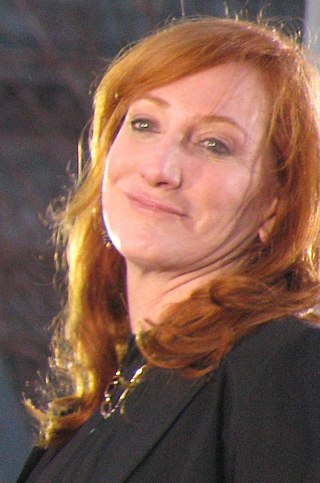
Vivienne Patricia Scialfa is an American singer-songwriter and guitarist. Scialfa has been a member of the E Street Band since 1984 and has been married to Bruce Springsteen since 1991. In 2014, Scialfa was inducted into the Rock and Roll Hall of Fame as a member of the E Street Band.
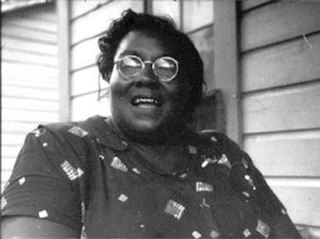
Adell Hall Ward, better known as Vera Hall was an American folk singer, born in Livingston, Alabama. Best known for her 1937 song "Trouble So Hard", she was inducted into the Alabama Women's Hall of Fame in 2005.
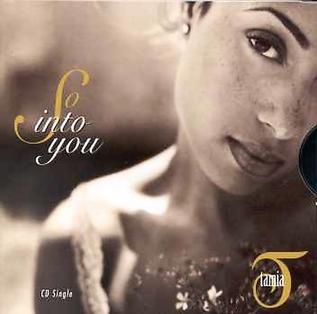
"So Into You" is a song performed by Canadian singer Tamia from her self-titled debut album Tamia (1998). It was written by Tamia, Tim Kelley, and Bob Robinson, with production helmed by Kelley and Robinson under their production moniker Tim & Bob. The song is built around a sample from "Say Yeah" (1978) by American soul band The Commodores. Due to the inclusion of the sample, its writers Lionel Richie and Ronald LaPreads are credited as songwriters. "So Into You" is a mid-tempo R&B song with lyrics describing the protagonist's feelings of love for her partner.
The Washboard Rhythm Kings, also known as the Washboard Rhythm Boys (1932), Georgia Washboard Stompers (1934-1935), Alabama Washboard Stompers (1930-1932), Washboard Rhythm Band (1932-1933), and Chicago Hot Five were a loose aggregation of jazz performers who recorded as a group for various labels between about 1930 and 1935. Bruce Johnson played washboard.
"Good Shepherd" is a traditional song, best known as recorded by Jefferson Airplane on their 1969 album Volunteers. It was arranged and sung by the group's lead guitarist Jorma Kaukonen, who described their interpretation of it as psychedelic folk-rock.

"Tell Me Why" is a song by British recording artist M.I.A. from her third studio album, Maya (2010). It was written by Maya "M.I.A." Arulpragasam, and Diplo, and production was handled by the latter. The song was recorded at Red Bull Studios in Santa Monica, California on Diplo's birthday in 2009. The producer admitted that "Tell Me Why" is his favorite song on the album, likening the track's sound to Wall of Sound and Motown. The song incorporates elements of Sarah Lancaster's "The Last Words of Copernicus" as performed by the Alabama Sacred Harp Singers. It was released worldwide as a digital download, under license to XL Recordings and N.E.E.T. Recordings, on 6 July 2010, as the fifth single from the album. No music video was made for the single, and M.I.A. has never performed it live.

Wrecking Ball is the seventeenth studio album by American recording artist Bruce Springsteen, released March 6, 2012, on Columbia Records. It was named best album of 2012 by Rolling Stone and along with the album's first single, "We Take Care of Our Own", was nominated for three Grammy Awards.

"Death to My Hometown" is a song written and recorded by American musician Bruce Springsteen and was the third single from his album, Wrecking Ball. It is a protest song, as well as a prominent example of Springsteen's experimentation with Celtic rock rhythms.
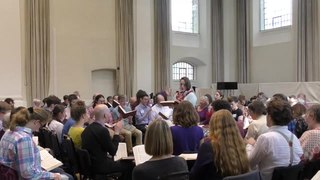
Sarah "Sally" Lancaster was an American composer in the Sacred Harp tradition. Three of her songs were published: "The Last Words of Copernicus", "I'm on My Journey Home", and "Sardis".

Offstage musicians and singers are performers who play instruments and/or sing backstage, out of sight of the audience, during a live popular music concert at which the main band is visible playing and singing onstage. The sound from the offstage musicians or singers is captured by a microphone or from the output of their instrument, and this signal is mixed in with the singing and playing of the onstage performers using an audio console and a sound reinforcement system. Offstage backup singers are also used in some Broadway musicals, as have offstage instrumentalists, in cases where an onstage actor needs to appear to play an instrument.
The Southern Journey is the popular name given to a field-recording trip around the Southern States of the USA by the renowned ethnomusicologist Alan Lomax. He was accompanied on the trip by his then-lover, English folk singer Shirley Collins. It resulted in the first stereo field-recordings in the Southern United States, and is perhaps most noted for the 'discovery' of 'Mississippi' Fred McDowell. The music collected on the trip has had inestimable impact on the development of popular music. Tracks recorded on the trip were sampled by Moby for his Platinum-selling album Play. It also served as the inspiration for the soundtrack to the Coen Brothers' film O Brother Where Art Thou. The Southern Journey is the subject of a fascinating autobiography by Shirley Collins entitled 'America over the Water'. It is also the subject of s 2017 feature documentary, The Ballad of Shirley Collins. Lomax' own recollections of the trip were documented in his autobiography "The Land Where Blues Began", which won the National Book Award for Nonfiction in 1993.
References
- ↑ "Alabama Sacred Harp Singers". Discogs. Retrieved March 10, 2016.
- ↑ "Alabama Sacred Harp Singers (2)". Discogs. Retrieved March 10, 2016.
- ↑ "Alabama Sacred Harp Singers (3)". Discogs. Retrieved March 10, 2016.
- ↑ "Bruce Springsteen's Sacred Harp Sample". March 28, 2012. Retrieved December 14, 2016.
- ↑ Chris Tinkham (March 22, 2012). "Bruce Springsteen: Wrecking Ball (Columbia) | Under the Radar - Music Magazine". www.undertheradarmag.com. Retrieved August 10, 2016.
- ↑ "Alabama Sacred Harp Singers (4)". Discogs. Retrieved March 10, 2016.
- ↑ Wallace, James B. (June 4, 2007). "Stormy Banks and Sweet Rivers: A Sacred Harp Geography". Southern Spaces. doi: 10.18737/M7M02W .